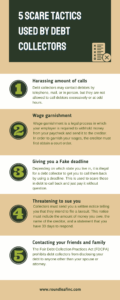5 Debt Collector Scare Tactics You Should Know

For many people, dealing with debt collectors is one of the most stressful aspects of having debt.
Debt collectors are businesses or individuals that are responsible for pursuing payments on delinquent debt, including consumer debt. In some cases, debt collectors may purchase debt from the original creditor in order to collect on it. In other cases, they may be hired by the creditor to handle debt collection.
Either way, debt collectors must follow certain laws and regulations when pursuing the debt. This includes things like notifying the consumer of their rights, sending written notice of the debt, and Ceasing communication if the consumer requests it in writing.
However, even with these laws in place, debt collectors still use “scare tactics’ ‘ to collect the debt in full. If you are being contacted by a collection company, it is important to know your rights and understand these tactics. This can help you to navigate the situation in a way that is best for you.
5 Debt Collector Scare Tactics
1. Harassing amount of calls
Debt collectors may work for the original creditor, such as a credit card company, or they may be hired by the creditor to collect the debt. They are subject to strict federal and state regulations regarding their behavior, and they are not allowed to harass debtors in an effort to collect payment.
Debt collectors may contact debtors by telephone, mail, or in person, but they are not allowed to call debtors excessively or at odd hours. They may not threaten debtors with violence or property damage, and they may not engage in other forms of harassment, such as calling debtors at work or contacting them repeatedly.
If you believe that a debt collector has violated your rights, you may file a complaint with the Consumer Financial Protection Bureau. Complaints can be filed online or by phone. The CFPB will investigate the complaint and take appropriate action if necessary. You should also contact an attorney if you believe you have been subjected to illegal debt collection practices.
2. Wage garnishment
Debt collectors may threaten wage garnishment in an attempt to get you to pay your debt.
However, wage garnishment is a legal process in which your employer is required to withhold money from your paycheck and send it to the creditor. In order to garnish your wages, the creditor must first obtain a court order.
If you are being threatened with wage garnishment, you should request a “validation notice” from the creditor. This notice will state the amount of the debt, the name of the creditor, and your rights under the Fair Debt Collection Practices Act.
If you believe that the debt is not yours, or if you think that the amount being requested is incorrect, you can dispute the debt. Once you have disputed the debt, the creditor cannot take any further action without first obtaining a court order.
If you are facing wage garnishment, it is important to understand your rights and options. An experienced attorney can help you navigate this process and protect your rights.
3. Giving you a deadline
Depending on which state you live in, it is illegal for a debt collector to get you to call them back by using a deadline. Debt collectors may try to pressure you by giving you a call and telling you that you must pay it by a certain deadline. This is used to scare those in debt to call back and just pay it without question. While this may seem like a legitimate way to collect a debt, it is actually a tactic that is prohibited by the Fair Debt Collection Practices Act (FDCPA).
The FDCPA is a federal law that protects consumers from abusive debt collection practices. Under the law, debt collectors are not allowed to use any false or misleading statements when trying to collect a debt. This includes giving you a deadline to repay the debt that does not exist.
If a debt collector has threatened you with a deadline, you may be able to take legal action against them. You should contact an experienced consumer debt attorney to discuss your options.
4. Threatening to sue you
If you’re facing debt collectors threatening to sue you, it’s important to know your rights and options.
First, collectors must send you a written notice telling you that they intend to file a lawsuit. This notice must include the amount of money you owe, the name of the creditor, and a statement that you have 30 days to respond.
Collectors are not allowed to call you more than once a week during this period. If you do not respond to the notice within 30 days, the collector can file a lawsuit against you.
However, even if a lawsuit is filed, you still have certain rights.
For example, collectors are not allowed to garnish your wages or take your property without winning the lawsuit and issuing a court order. If you are sued by a debt collector, it’s important to seek legal help as soon as possible to protect your rights and explore your options.
Time is of the essence for any legal matter, there are deadlines set by the court that you have to respond to in time. Throwing away any mail or not looking at it is not admissible in court and will give the creditor an easy victory for collecting money from you.
5. Contacting your friends and family
Debt collectors are known for being aggressive and relentless in their attempts to collect a debt.
But what many people don’t realize is that they can also be very intrusive, calling your family and friends and asking them for personal information about you. This can be extremely embarrassing and stressful, especially if you’re already struggling to pay off your debts.
Fortunately, there are laws in place that protect you from this type of harassment.
The Fair Debt Collection Practices Act (FDCPA) prohibits debt collectors from disclosing your debt to anyone other than your spouse or attorney. Additionally, the FDCPA prohibits debt collectors from calling your family and friends simply to harass or embarrass you. You do have to make sure to document the calls for violations.
If you’re being harassed by a debt collector, don’t hesitate to contact an experienced attorney who can help you assert your rights.
Don’t let debt collectors scare you
Debt collectors can be scary, but they don’t have to be. There are some things you can do to protect yourself from their tactics.
- First, know your rights. The Fair Debt Collection Practices Act protects consumers from abusive debt collection practices.
- Second, keep records of all communications with the debt collector, including phone calls and letters. This will help you build a case if the debt collector is violating the law.
- Third, consider talking to a lawyer. A lawyer can help you understand your rights and options, and may even be able to negotiate with the debt collector on your behalf.
- Fourth, don’t be afraid to stand up for yourself. If a debt collector is harassing you or using illegal tactics, you have the right to file a complaint. Don’t let debt collectors bully you into paying more than you owe.
- Finally, Don’t wait, waiting can cause more issues.
With a little knowledge and preparation, you can stand up for your rights and protect yourself from their scare tactics.
If you’re experiencing the above tactics, contact Roundleaf!
How can a debt collector contact me?
Debt collectors can call you, email, send letters, text and contact you through social media. Learn more
How can I get a debt collector to stop calling me?
You can send them a letter asking them to stop contacting you. Make sure to keep a letter for your records. You may also ask them to stop contacting you by calling them and requesting it over the phone.
Can a debt collector contact my family and friends about my debt?
A debt collector can contact your family and friends to find out information such as your address and phone number to help get ahold of you. However, they can not discuss anything about your debt with them.

